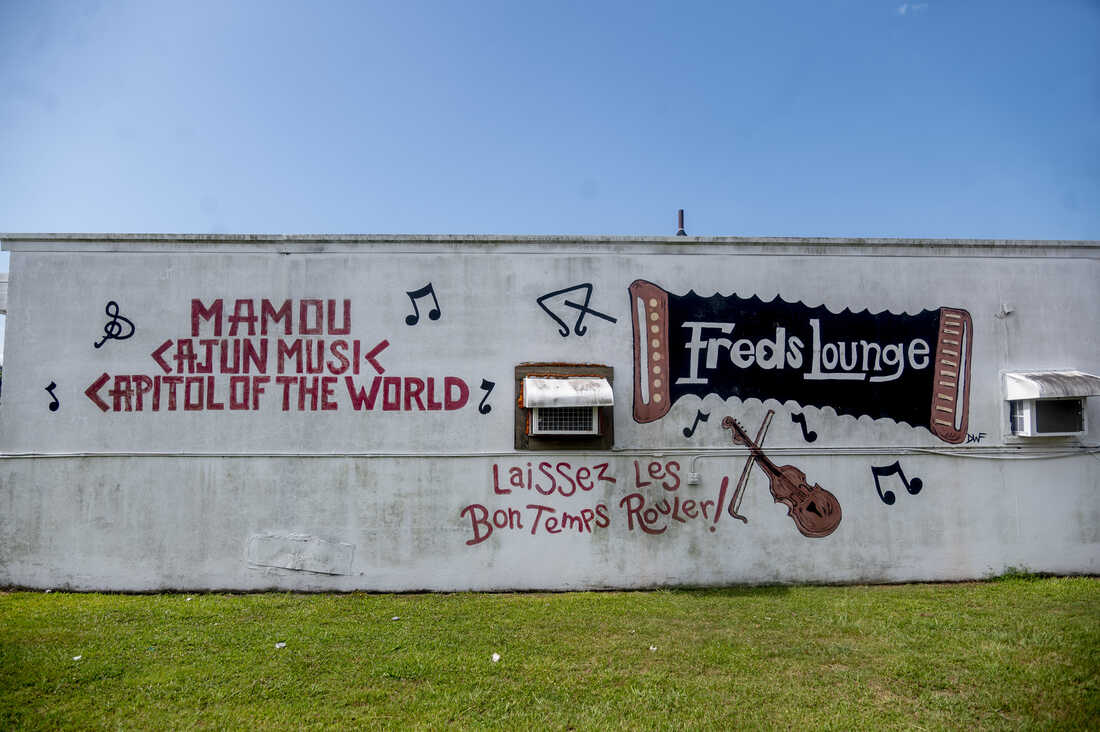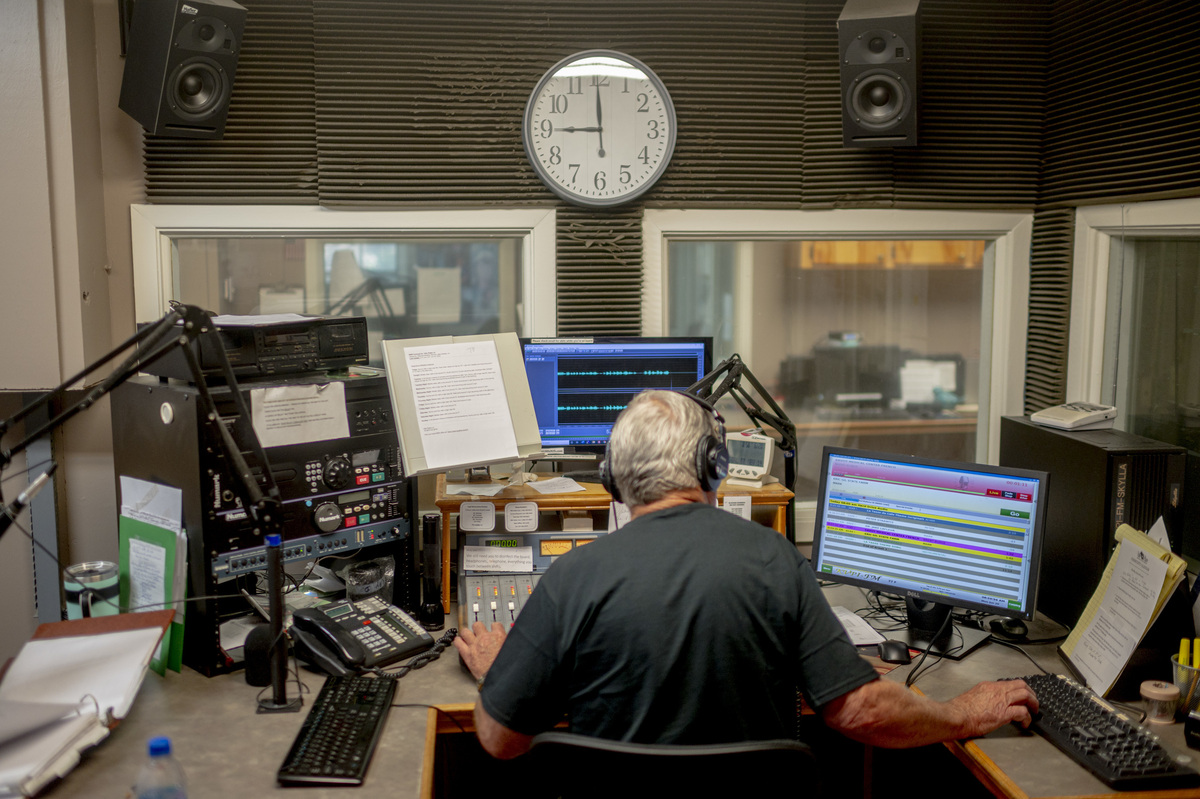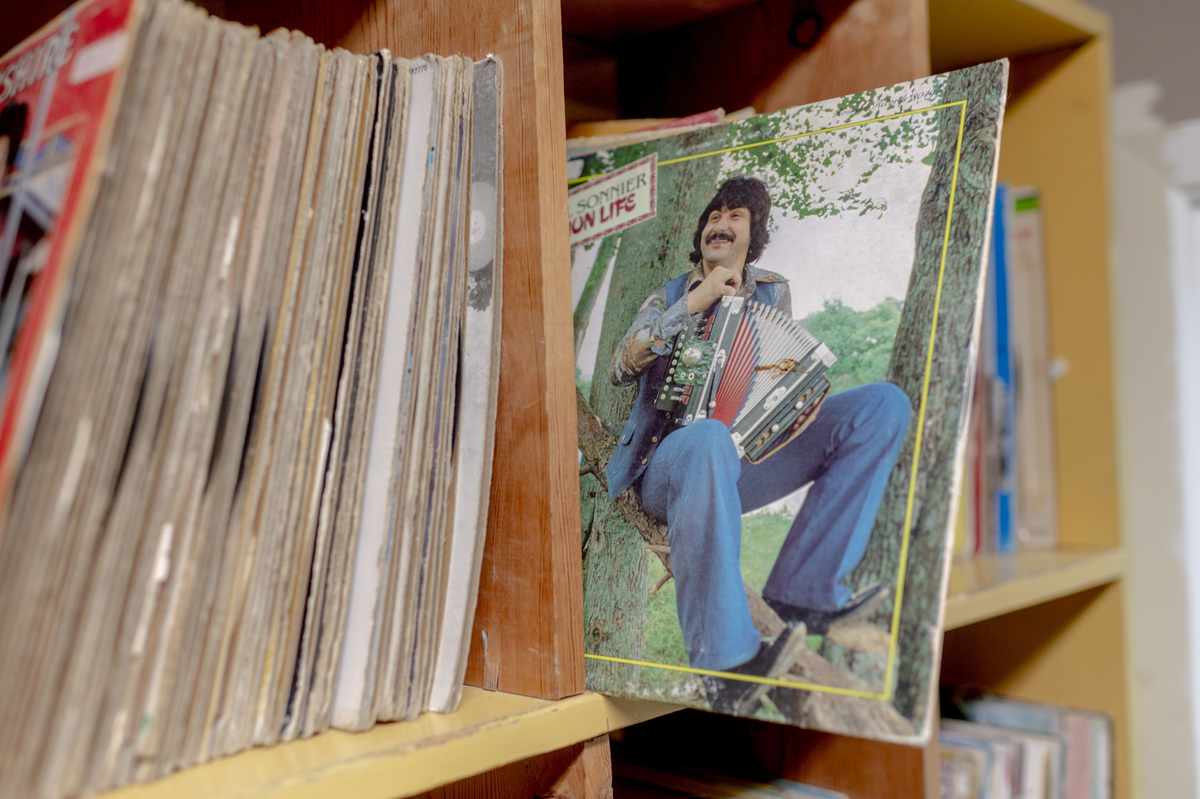Le bon temps continue to roll on Cajun radio in Southern Louisiana

Donny Broussard and the Louisiana Stars play during the KVPI morning show at Fred’s Lounge.
Emily Kask for NPR
hide caption
toggle caption
Emily Kask for NPR

Donny Broussard and the Louisiana Stars play during the KVPI morning show at Fred’s Lounge.
Emily Kask for NPR
VILLE PLATTE, La.— By 8:30 Saturday morning, the red-brick tavern called Fred’s Lounge is already filled with rice farmers, bikers from New Orleans and wide-eyed French tourists ready to party. Some sit at the varnished bar sipping Budweisers and Bloody Marys, while couples waltz gracefully across the worn linoleum. A traditional Cajun band — accordion, fiddle, rhythm guitar, bass, drums and triangle — provides the soundtrack.
And the whole world can listen.
Saturday morning at Fred’s is broadcast live on “The Legend” 1050 KVPI and streamed online. The radio announcer sits at a small table under a hand-written sign: “Please do not stand on the chairs or cigarette machine.” The little station has been on the air for nearly 70 years doing everything it can to keep alive a dying language.

The broadcast goes on as Donny Broussard and the Louisiana Stars play during the KVPI morning show at Fred’s Lounge.
Emily Kask for NPR
hide caption
toggle caption
Emily Kask for NPR

The broadcast goes on as Donny Broussard and the Louisiana Stars play during the KVPI morning show at Fred’s Lounge.
Emily Kask for NPR

Dancing and merriment ensue as Donny Broussard and the Louisiana Stars play during the KVPI morning show.
Emily Kask for NPR
hide caption
toggle caption
Emily Kask for NPR

Dancing and merriment ensue as Donny Broussard and the Louisiana Stars play during the KVPI morning show.
Emily Kask for NPR
“Venez visiter D.I.’s Cajun Restaurant in Basile et écoutez Scotty Pousson et les Pointe-Aux-Loups Playboys!” intones Mike Perron into his microphone, plugging one of his sponsors between songs.
Perron is a 71-year-old city councilman, retired auto-body repair man, and part-time DJ who grew up speaking Cajun French.
“I do my sponsors mostly in English, but I do some in French,” he says, standing outside as the morning warms and the cicadas pulse. “The people over here, a lot of ’em don’t understand all the French words so I do it in English, too. We call that a Franglais — little bit of French, little bit of English. That’s how we call it over here.”

Fred’s Lounge in Mamou, La., is home to the Saturday morning live broadcast on “The Legend” 1050 KVPI and streamed online.
Emily Kask for NPR
hide caption
toggle caption
Emily Kask for NPR

Fred’s Lounge in Mamou, La., is home to the Saturday morning live broadcast on “The Legend” 1050 KVPI and streamed online.
Emily Kask for NPR

Jackie Miller and Mike Perrone host the KVPI morning show.
Emily Kask for NPR
hide caption
toggle caption
Emily Kask for NPR

Jackie Miller and Mike Perrone host the KVPI morning show.
Emily Kask for NPR
Fred’s Lounge is in the town of Mamou, situated among the rice fields and crawfish ponds of what’s called the Cajun prairie. So successful are Saturdays at Fred’s that the tavern is closed the rest of the week. The live radio feed was the idea of a local educator named Revon Reed back in the 1960s. Now his son, Seth Reed, a metalworker, is a Saturday morning regular.
“We dance, we drink, we have a good time,” Seth says. “This is the only bar that’s still old-school. Nothing has changed since it was built. That’s what I love about it. They still have the same urinal from back in the ’40s in the bathroom.”

Inside the KVPI radio station in Ville Platte, La.
Emily Kask for NPR
hide caption
toggle caption
Emily Kask for NPR

Inside the KVPI radio station in Ville Platte, La.
Emily Kask for NPR

Jackie Miller and Mike Perrone host the KVPI morning show in Cajun French in Ville Platte, La.
Emily Kask for NPR
hide caption
toggle caption
Emily Kask for NPR

Jackie Miller and Mike Perrone host the KVPI morning show in Cajun French in Ville Platte, La.
Emily Kask for NPR
The Acadians, or Cajuns, who populate this region descended from Roman Catholic French Canadians who were expelled from the Nova Scotia region by the British in the mid-1700s. They made their way to the bayou country of South Louisiana and here they thrived, preserving their culture and folkways. But a number of factors worked against the language. Cajuns were punished for speaking French in school, Cajun GIs left the region to fight in the world wars and learned English, the discovery of oil ushered in more English, and television further diluted the language.
Radio is part of a broad movement to save Cajun French from extinction.
Eight radio stations in Southern Louisiana still broadcast partially in French. KVPI, located in Ville Platte (Flat Town), does news, weather, commercials, talk, a swap shop, and even obits in French — more than any other station. This year, the Louisiana Association of Broadcasters gave KVPI a Uniquely Louisiana award.

Donny Broussard and the Louisiana Stars play during the KVPI morning show at Fred’s Lounge in Mamou, La.
Emily Kask for NPR
hide caption
toggle caption
Emily Kask for NPR

Donny Broussard and the Louisiana Stars play during the KVPI morning show at Fred’s Lounge in Mamou, La.
Emily Kask for NPR
While the live Cajun music broadcast from Fred’s Lounge is internationally renowned, the station’s most popular program is a daily call-in show, La Tasse de Café, the cup of coffee. La Tasse to regulars.
The weekday morning program begins: “Bonjour, mes amis. Comment se va ce matin? Nois aimerions avoir de vos nouvelles, alors appelez-nous.” (Hello friends, how are you this morning? We would love to hear from you so give us a call.)
Yet here in deeply conservative Trump country, the callers don’t talk about abortion or election fraud or the perfidious Democrats. They’re discussing where to find the sweetest watermelons, what food to bring to the cemetery on All Souls Day, how to kill maggots under the house, how they miss the fins on cars of the 1950s, and when is the best squirrel hunting.
One host bid adieu to a voluble caller, “And a happy squirrel weekend to you!”
In an era of venomous talk radio, La Tasse de Café is downright wholesome.

It’s a hand-clapping good time as Donny Broussard and the Louisiana Stars play during the KVPI morning show at Fred’s Lounge.
Emily Kask for NPR
hide caption
toggle caption
Emily Kask for NPR

It’s a hand-clapping good time as Donny Broussard and the Louisiana Stars play during the KVPI morning show at Fred’s Lounge.
Emily Kask for NPR

Donny Broussard and the Louisiana Stars play during the KVPI morning show at Fred’s Lounge.
Emily Kask for NPR
hide caption
toggle caption
Emily Kask for NPR

Donny Broussard and the Louisiana Stars play during the KVPI morning show at Fred’s Lounge.
Emily Kask for NPR
The station’s general manager is Mark Layne, born Martel Ardoin. Layne started at KVPI (which stands for Keeping Ville Plate Informed) in 1971 when he was in high school, and he’s been there ever since.
“We really promote the French language and our French culture,” Layne says, “and I emphasize Cajun French. There is a bit of difference. We have our own lingo and dialect down here, and we’re proud of it.”
Most of the elderly French-speaking callers want to reminisce about life on the Cajun prairie back in the day. On a Monday morning in late June, a gentleman called in to remember a particularly competitive race for sheriff. Both candidates spoke French as their first language.
“The one candidate was telling the other in French, ‘As for you, you couldn’t track a black elephant in the snow!'” says Jackie Duplechin Miller, the 81-year-old co-host of La Tasse on that morning.

Floyd Soileau shows historical newspaper clippings he’s saved at his record store in Ville Platte, La.
Emily Kask for NPR
hide caption
toggle caption
Emily Kask for NPR
The idea for La Tasse de Café came about in the 1960s from Floyd Soileau (pronounced Swallow), a record producer, book publisher and Cajun raconteur in Ville Platte. He regularly calls in to tell old yarns in French, but there are fewer and fewer old-timers, like him, who speak the language of their grandparents.
“Sadly, a lot of our Cajun French listeners have passed on and some of the young people are trying to pick up on it but it’s not coming fast enough,” says Soileau. “It’s going to be a thing of the past, unfortunately, as my age group goes. And I’m afraid it’s going to be tough to keep it going.”
The Cajun patois in Louisiana continues its steep decline. The American Community Survey on language estimated the number of French speakers at about 77,000 in 2020, down from 136,000 in just a decade.

The Swamp Pop Museum in Ville Platte, La.
Emily Kask for NPR
hide caption
toggle caption
Emily Kask for NPR

The Swamp Pop Museum in Ville Platte, La.
Emily Kask for NPR

Barry Ancelet poses for a portrait in his home in Ossun, La.
Emily Kask for NPR
hide caption
toggle caption
Emily Kask for NPR

Barry Ancelet poses for a portrait in his home in Ossun, La.
Emily Kask for NPR
“It really has become a language of performance, a language of choice, if you will,” says Barry Jean Ancelet, renowned folklorist and professor emeritus of Francophone Studies at the University of Louisiana Lafayette.
While he acknowledges that native French speakers are passing away one by one, he is heartened that young musicians, for instance, are composing songs in French. And Cajun culture, overall, remains robust.
“Are you going to tell Danny Benoit, who makes the best gumbo in the world,” Ancelet says of a hypothetical character, “who loves to hunt and fish, who goes out to dance Cajun music and Zydeco, and has a big family. And he doesn’t speak French. Are you going to tell him he’s not Cajun? I wouldn’t do it. And if you do it, I would duck because he still feels profoundly Cajun.”
For all the latest Entertainment News Click Here
For the latest news and updates, follow us on Google News.
